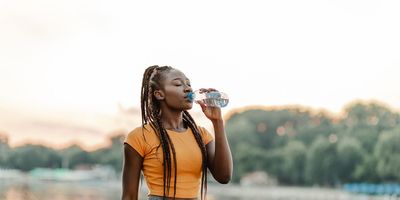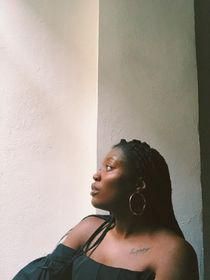Wellness

Ad
‘Drinking my water and minding my business’ has always been my mood, but with all the talk around hydration lately, I’ve started wondering what exactly is the right way to drink my water. On one hand, there is the school of thought that subscribes to drinking a gallon of water a day. There’s a school of thought that subscribes to somewhere around the ballpark of 2-3 liters of water per day. There are also water enthusiasts who wouldn’t dare touch a bottle of purified water over alkaline water. And then there’s the side of the internet who are head to head about drinking plain water and its benefits and adding enhancements to “superpower” it.
As with other aspects of health, figuring out how to hack your way to better drinking water has been making waves on the internet. I, for one, enjoy my daily fix of chlorophyll water which is said to be an internal deodorizer, clear your skin, and reduce inflammation in the body among other things. Plain water is said to be out, while 'enhanced' water is said to be in. Allegedly this is the case if you’ve been hitting your daily water intake consistently but still don’t feel hydrated and/or if you find yourself peeing almost immediately after drinking said water. If that sounds like you, according to TikTok, you could be drinking your water wrong.
And you might need to unsubscribe from plain drinking water. According to creators like @calibabyoficial, leveling up your water with baking soda, Himalayan pink salt, and lemon or lime is essential for proper hydration. But how true is this?
I reached out to dietitian Rosie Mensah, MPH to learn more about the plain drinking water versus enhanced water phenomena and to demystify why some of us are following the ‘hydrate, hydrate, hydrate’ mantra to a T but still might be feeling thirsty.
You’re drinking all of this water, why do you still feel thirsty?

Michael Poehlman/Getty Images
First things first, if you are waiting to drink water until you are feeling thirsty, chances are, you are already dehydrated. Mensah describes thirst as a sign of mild dehydration. So you should be consuming water frequently enough throughout the day that you do not get to this point and so that the body is properly hydrated. However, if you feel that you have been drinking enough water and your thirst levels persist, Mensah suggests that this could be pointing to an underlying health concern.
She continues, "If you are feeling excessively thirsty, there could be something else going on, especially if you are staying hydrated regularly. That’s something that I would encourage folks to see a health professional about because it could mean there are other bodily issues happening and could mean other conditions."
Is going to the bathroom after you drink water normal?
Whenever I think of drinking enough water, I also think about how many bathroom breaks are going to ensue shortly after. In the recent season of The Real Housewives of Potomac, one of the ladies shared that her kidney stones came from not drinking enough water each day because she feared needing to use the restroom too much while she had things to do. And I get it, who wants to drink water just to have to get up and release it shortly after? I believe that's why all the conversation around 'proper' hydration has started.
There had to be a connection between not drinking enough of the right water and using the bathroom too quickly to allow your body to retain the benefits of drinking water, right? Turns out, not exactly. It's all about the size of your bladder and the fact that it's only possible to retain a certain amount of fluids before it gets full. And once it's full, it's time to use the bathroom. The bladder holds approximately 16 ounces of fluid. If you are consuming more water than that, within an hour or two you are absolutely going to need to use the bathroom frequently.
"If you are drinking more, you are gonna have to go to the bathroom more. That's just the reality," Mensah adds. "But that’s like a good thing. It’s moving through your body and you want that. Your organs and your cells are being nourished."
So yes, going to the bathroom is normal. Your bladder is full and it's doing what it's supposed to do. If you want to decrease how often you go without being dehydrated, consider pivoting from chugging your water first thing in the morning to sipping throughout the day and limiting your intake to no more than 8 ounces each hour.
Does adding baking soda to water increase pH?
jayk7/Getty Images
The loaded question. The answer might depend on the expert, but according to Mensah, there are few studies showing the health benefits of adding baking soda to plain drinking water to alkalinize it. Based on my own research, the tactic came up most often when referring to pool water maintenance, which makes sense. I have, however, also seen other experts touting the pH and hormone regulation benefits of adding a little baking soda to your water. Mensah says that the human body already does a pretty good job at maintaining a healthy pH balance, which again makes sense.
"Whatever you are consuming, putting into your body, your body has mechanisms to put it at a functioning pH," she explains. "You could have plain water, plain tap water that is filtered to maintain the same benefits as drinking other forms of water. I think, again, a lot of it could just be a marketing tactic. But in terms of health benefits, you can get the same benefits from regular plain water."
It could depend on the expert, but if you want to add baking soda to your water for the benefits, consider talking to a professional about your individual dietary needs.
What about adding Himalayan pink salt to your water?
Adding Himalayan pink salt to your water is how you make water referred to as sole water. It is said that by adding Himalayan pink salt to your drinking water, you are adding trace minerals to it that make it easier for the body to retain these minerals. It is also believed to help with electrolyte balance, digestion, energy, and sleep. But, there is also not a lot of conclusive research to support these claims.
If you want to add Himalayan pink salt to your water because of its trace minerals in hopes of further nourishing the body, be my guest. But similarly to the baking soda mentioned above, it's not something you have to do to your water. Drinking plain water is more than enough.
What does adding lemon or lime to water do?
Westend61/Getty Images
We've all heard about adding fruit to water to get the benefits of said fruit from the water we're drinking, but adding those slices might just be an aesthetic choice more than a health choice. Although there are many articles around the internet supporting adding lime, or better yet lemon, to your water (especially detox water content) and the benefits of it, there are few studies that support such claims as it relates to adding lemon and lime to the water you drink specifically. However, people have reported having glowing skin as a result of drinking lemon water regularly and better digestion (although those things could be from the water more than the citrus element of the drink).
"I think a lot of it people [feel] like it makes the flavor [of water] better because I know there are some people that say they just don’t like to drink water," Mensah notes. "But adding those things can make it just a better drinking experience for you. But in terms of like health, there’s really not much that it does."
Does adding salt, lime juice, or lemon juice to water make it electrolyte water?
But what about electrolyte water? Surely, some benefits support adding electrolytes to water like lime juice, lemon juice, or salt to your water. And according to Heathline, there very well may be. However, these findings also support the fact that tap water and bottled water also contain electrolytes, just a lot less concentrated than an electrolyte-enhanced sports drink like Gatorade or Powerade. If it brings you joy to add extra sodium, trace minerals, and lemon or lime juice to your water to reap even more benefits of the minerals responsible for facilitating some important bodily functions, do you. But as Mensah has shared, you don't have to.
Electrolyte water or electrolyte-enhanced drinks like sports drinks and Pedialyte are usually recommended in cases of severe hydration, illnesses that cause fluid loss, intense workouts that last beyond an hour, long periods of heat exposure, or if you lose a lot of sweat and/or other fluids during exercise. In all of these cases, speak to your doctor about the best way to replace the electrolytes you might lose in these circumstances. Outside of that, regular water should have you and your day-to-day hydration needs covered.
How much water do you need to drink to be hydrated?
According to our expert Mensah, hydration is all relative and differs from person to person based on individual needs, body shapes, and sizes. "The recommendation of around 8 glasses [a day] is really just to ensure people are staying hydrated," she clarifies. "But that doesn't necessarily factor in other fluids that you have [during the day]. If you are a tea drinker, you may opt for more tea than clean water. And that’s still fine because it’s still a nourishing beverage. But it really depends on the individual."
Someone who is more physically active might have a daily water intake that signifies they require more water. Someone who drinks more coffee might also require more because of the amount of fluid they excrete as a result. Mensah explains that while you can track your water throughout the day to make sure you are getting enough, it's not always a necessary step as long as you are making sure you are consuming water frequently.
Is drinking plain water enough to hydrate you?
blackCAT/Getty Images
This article came about because of all the different information swirling in the social media sphere and the question it left me thinking about. The short answer to this one is yes, drinking plain water is enough to hydrate you. But if you want to make things more enticing to your palette or more nourishing to the body by trying out tips from TikTok experts here and there, then do it. Just know if you don't want to succumb to the pressure of suggestions, that's okay too. As long as you're getting those ounces in daily, and aren't excessively thirsty, your hydration levels are fine.
As with everything mentioned in this article, Mensah advises speaking with a health professional about your own individual needs, what your body might be lacking, and nutritious choices that could help improve those matters.
Let’s make things inbox official! Sign up for the xoNecole newsletter for daily love, wellness, career, and exclusive content delivered straight to your inbox.
Featured image by blackCAT/Getty Images
ALSO ON XONECOLE


